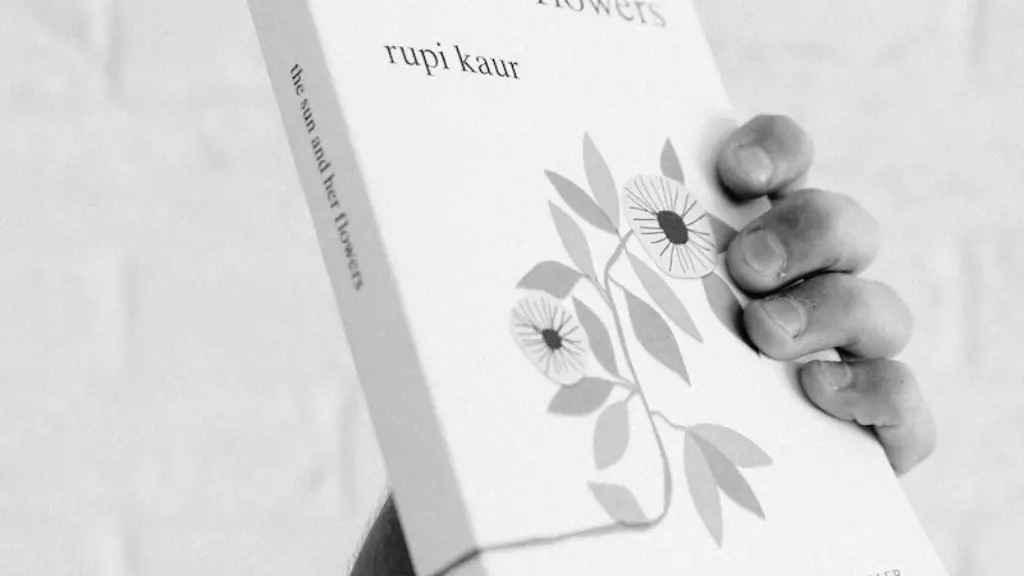The Harlem Renaissance was an incredible time in African American culture, bringing new focus and attention to people of color and the struggles they faced. It was not only a period of artistic productivity for African American writers, but also a landmark in terms of identity and recognition. Langston Hughes was one of the most celebrated poets of the era and his work had a great influence on the movement. His poems resonated with many in black communities, echoing their experiences, thoughts, and feelings.
One of the most recognized elements of Hughes’ poetry is his use of poignant imagery to communicate his ideas. Hughes was a master of poetic detail, often times referring to everyday objects, such as jars of apricots, padlocks, and trees as metaphors to describe social struggles, as seen in his famous poem “Harlem” – “What happens to a dream deferred?/ Does it dry up/ like a raisin in the sun…” These particular verses have become so renowned that many have likened them to the modern American anthem – an apt comparison for someone who was a key figure of the Harlem Renaissance.
Hughes also used his work to promote unity among African Americans by taking a stand against racial discrimination. His poem “I, Too” is a perfect example of this as Hughes rejects feelings of rejection, and turns them into something positive – “Tomorrow/ I’ll be at the table/ When company comes/ Nobody’ll dare/ Say to me/ ‘Eat in the kitchen.’” Although the poem moves the audience, Hughes’ primary intention was to deliver a powerful message and, in doing so, motivate people to no longer accept the prejudice they experienced daily.
On a similar note, Hughes was also a vocal proponent of social justice, particularly advocating for greater freedoms and rights for black people in the US. His poem “The Negro Speaks of Rivers”, for example, is a tribute to those African Americans that actively fought for change and peace – “I’ve known rivers:/ Ancient, dusky rivers.” Hughes was, in essence, using his platform to remind African Americans of their long and proud heritage – a historical reminder that in itself was hugely inspiring.
In conclusion, Langston Hughes’ poetry had an immense influence on the Harlem Renaissance. Not only was he an incredibly gifted poet in his own right, but his words also galvanized and inspired those in the African American community at the time. Hughes’s message of social unity, justice, and pride were truly embraced during the Harlem Renaissance.
The Impact of Langston Hughes’s Words
The impact of Langston Hughes’ words during the Harlem Renaissance cannot be overstated. His work resonated strongly with people of color and recaptured their sense of history and cultural identity. Through powerful imagery and a poetic voice that echoed the experiences of the African American people, Langston Hughes’ poetry showcased the reality of life for black people. Consequently, many of his poems have become touchstones of the Harlem Renaissance.
Hughes’ work is often referred to as ‘race poetry’ for both its direct references to race and racial experiences, and its frank critique of white America. Race was an issue that the Harlem Renaissance was built upon, and Langston Hughes’ poems addressed this explicitly. Hughes’s writing was energetic, yet powerfully subtle in its treatment of race; it helped to redefine race relations as well as stand up to oppressive institutions such as Jim Crow.
One could argue that Langston Hughes played a pivotal role in stirring the black consciousness that eventually fuelled the Civil Rights Movement of the 1960s. By stressing black pride and racial identity, Hughes’ writing spoke to the moral conscience of black Americans. His words served to
unify people and helped create a sense of community and solidarity. Indeed, Langston Hughes’ poetry both shaped the Harlem Renaissance and predicted the course of future African American politics.
iInfluence on Other Poets
Langston Hughes has had an indelible influence on American poetry, particularly on African American poets. He was able to capture the spirit and struggles of black life, and his work still continues to inspire generations of writers. Many poets today still cite his signature style of poetic devices, storytelling, and imagery as having a major influence on their writing.
Hughes has also been credited for introducing elements of jazz and blues into literature. By directly incorporating the music, language, and rhythms of African American culture into his poems, Hughes was able to uniquely capture the African American experience. It may be argued that this fusion of music, language, and story was an innovational feat that changed poetic conventions forever.
Moreover, Hughes was also a major figure within the artistic landscape of post-colonialism. He created a narrative of unrest and defiance, chronicling the African American experience and their journey out of enslavement. Writing about the interplay between Africans, Native Americans, and Europeans, Hughes was able to produce a unique body of work that inspired many writers in his wake.
The Legacy of Langston Hughes
Langston Hughes is generally considered to be one the most significant figures of the Harlem Renaissance, and his legacy continues to live on today. His writing has been instrumental in shaping not only modern African American culture, but poetry as an art form. His unique style and commitment to racial and social justice are still seen by many writers and readers of modern poetry.
As such, many writers still draw inspiration from Hughes’ work and his vision of a brighter, more equitable future for those of African American heritage. Certainly, any discussion of the Harlem Renaissance must include that of Langston Hughes and his incredible legacy.
An Influential Poet
Langston Hughes was an influential poet, not only for the Harlem Renaissance but for contemporary American literature, as well. He wrote with honesty and emotion, exploring the daily lives of African Americans and their experiences. His work was deeply affected by the history of African Americans, including the trans-Atlantic slave trade, the struggles endured during the Civil Rights Movement, and the rise of black empowerment.
His writing was simple yet powerful, and it helped to inspire a new generation of African American poets. Hughes embraced the importance of embracing one’s culture and identity and his words continue to be celebrated by many today. His poems captured the spirit of the Harlem Renaissance and his influential voice has had a lasting impact on the evolution of American literature.
The Relevance of Langston Hughes in Today’s Society
The relevance of Langston Hughes in today’s society cannot be ignored. His work is a reflection of the prejudice that African Americans continue to face, as well as their struggle for dignity and justice. Through his poetry, Hughes was able to reach out to people and show them the possibility for a better future. He was able to bring into focus the ills of society, highlighting the struggles of oppressors, and to show the beauty of being a person of color.
Though it has been several decades since the Harlem Renaissance, Hugo’s work is still relevant today. His words continue to inspire, challenge, and motivate people, including many artists and musicians in the contemporary world. His influence is evident in the work of artists like Jay Z, Kanye West, and Kendrick Lamar who have all paid tribute to the legacy of Langston Hughes through their music.
In short, Hughes was ahead of his time, and his writing continues to be an incredible source of knowledge and understanding. His influence is still being felt today, and his work has been an invaluable contribution to both the African American literary tradition and to literature as a whole.




